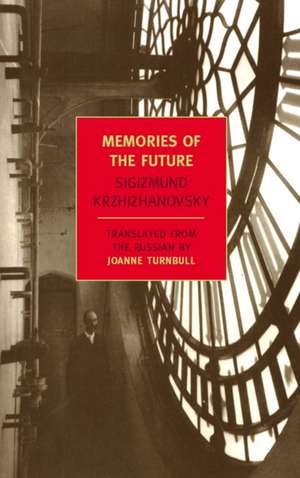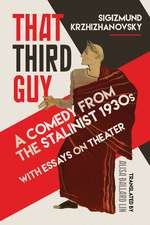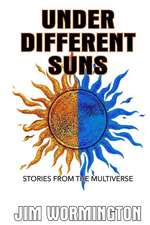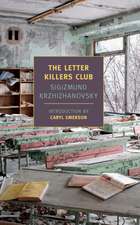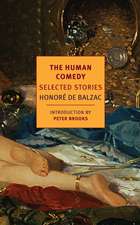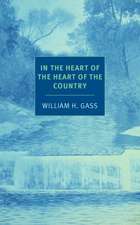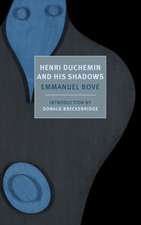Memories of the Future: New York Review Books Classics
Autor Sigizmund Krzhizhanovskyen Limba Engleză Paperback – 31 oct 2009
Din seria New York Review Books Classics
-
 Preț: 88.86 lei
Preț: 88.86 lei -
 Preț: 99.24 lei
Preț: 99.24 lei - 16%
 Preț: 79.25 lei
Preț: 79.25 lei -
 Preț: 77.73 lei
Preț: 77.73 lei -
 Preț: 124.55 lei
Preț: 124.55 lei -
 Preț: 98.73 lei
Preț: 98.73 lei -
 Preț: 83.30 lei
Preț: 83.30 lei -
 Preț: 113.45 lei
Preț: 113.45 lei -
 Preț: 102.47 lei
Preț: 102.47 lei -
 Preț: 81.20 lei
Preț: 81.20 lei -
 Preț: 174.64 lei
Preț: 174.64 lei -
 Preț: 110.73 lei
Preț: 110.73 lei -
 Preț: 119.57 lei
Preț: 119.57 lei -
 Preț: 94.01 lei
Preț: 94.01 lei -
 Preț: 85.29 lei
Preț: 85.29 lei -
 Preț: 101.24 lei
Preț: 101.24 lei -
 Preț: 182.08 lei
Preț: 182.08 lei -
 Preț: 142.67 lei
Preț: 142.67 lei -
 Preț: 90.72 lei
Preț: 90.72 lei -
 Preț: 103.29 lei
Preț: 103.29 lei -
 Preț: 113.30 lei
Preț: 113.30 lei -
 Preț: 100.59 lei
Preț: 100.59 lei -
 Preț: 126.41 lei
Preț: 126.41 lei -
 Preț: 107.40 lei
Preț: 107.40 lei -
 Preț: 174.03 lei
Preț: 174.03 lei -
 Preț: 107.44 lei
Preț: 107.44 lei -
 Preț: 89.27 lei
Preț: 89.27 lei -
 Preț: 85.34 lei
Preț: 85.34 lei -
 Preț: 90.09 lei
Preț: 90.09 lei -
 Preț: 119.36 lei
Preț: 119.36 lei -
 Preț: 99.60 lei
Preț: 99.60 lei -
 Preț: 102.25 lei
Preț: 102.25 lei -
 Preț: 127.42 lei
Preț: 127.42 lei -
 Preț: 96.27 lei
Preț: 96.27 lei -
 Preț: 85.97 lei
Preț: 85.97 lei -
 Preț: 136.91 lei
Preț: 136.91 lei -
 Preț: 161.86 lei
Preț: 161.86 lei -
 Preț: 105.17 lei
Preț: 105.17 lei -
 Preț: 88.86 lei
Preț: 88.86 lei -
 Preț: 94.83 lei
Preț: 94.83 lei -
 Preț: 118.21 lei
Preț: 118.21 lei -
 Preț: 87.20 lei
Preț: 87.20 lei -
 Preț: 95.45 lei
Preț: 95.45 lei -
 Preț: 97.50 lei
Preț: 97.50 lei -
 Preț: 111.96 lei
Preț: 111.96 lei -
 Preț: 133.18 lei
Preț: 133.18 lei -
 Preț: 100.18 lei
Preț: 100.18 lei -
 Preț: 75.23 lei
Preț: 75.23 lei -
 Preț: 91.13 lei
Preț: 91.13 lei -
 Preț: 94.86 lei
Preț: 94.86 lei
Preț: 97.91 lei
Nou
Puncte Express: 147
Preț estimativ în valută:
18.74€ • 20.36$ • 15.75£
18.74€ • 20.36$ • 15.75£
Carte disponibilă
Livrare economică 31 martie-14 aprilie
Livrare express 14-20 martie pentru 30.58 lei
Preluare comenzi: 021 569.72.76
Specificații
ISBN-13: 9781590173190
ISBN-10: 1590173198
Pagini: 228
Dimensiuni: 133 x 204 x 17 mm
Greutate: 0.28 kg
Editura: NEW YORK REVIEW OF BOOKS
Seria New York Review Books Classics
ISBN-10: 1590173198
Pagini: 228
Dimensiuni: 133 x 204 x 17 mm
Greutate: 0.28 kg
Editura: NEW YORK REVIEW OF BOOKS
Seria New York Review Books Classics
Notă biografică
SIGIZMUND KRZHIZHANOVSKY (1887–1950), the Ukrainian-born son of Catholic Poles, studied law and classical philology at Kiev University. After graduation and two summers spent exploring Europe, he was obliged to clerk for an attorney. A sinecure, the job allowed him to devote the bulk of his time to the study of literature and his own writing. In 1920, after a brief stint in the Red Army, Krzhizhanovsky began lecturing intensively in Kiev on the theater and music. The lectures continued in Moscow, where he moved in 1922, by then well known in literary circles. Lodged in a cell-like room on the Arbat, Krzhizhanovsky wrote steadily for close to two decades. His philosophical and satirical stories with fantastical plots ignored official injunctions to portray the new Soviet state in a positive light. Three separate efforts to print different collections were quashed by the censors, a fourth by World War II. Not until 1989 could these surreal fictions begin to be published. Like Poe, Krzhizhanovsky takes us to the edge of the abyss and forces us to look into it. “I am interested,” he said, “not in the arithmetic, but in the algebra of life.”
JOANNE TURNBULL has translated a number of books from Russian—including Andrei Sinyavsky’s Soviet Civilization and Ivan the Fool, Asar Eppel’s The Grassy Street, and Andrei Sergeyev’s Stamp Album, and Sigizmund Krzhizhanovsky’s Seven Stories, winner of the 2007 Rossica Translation Prize—all in collaboration with Nikolai Formozov. She lives in Moscow.
JOANNE TURNBULL has translated a number of books from Russian—including Andrei Sinyavsky’s Soviet Civilization and Ivan the Fool, Asar Eppel’s The Grassy Street, and Andrei Sergeyev’s Stamp Album, and Sigizmund Krzhizhanovsky’s Seven Stories, winner of the 2007 Rossica Translation Prize—all in collaboration with Nikolai Formozov. She lives in Moscow.
Recenzii
"For anyone enthralled by the satirical avant-garde that briefly shone on the fringes of Soviet culture in the 1920s, here’s a revelation. Krzhizhanovsky somehow scraped a living in post-revolution Moscow as he wrote stories infused by a disturbing surrealism. Joanne Turnbull’s fine translations of seven won the Rossica Prize, and this edition should gain them a flock of new fans." Boyd Tonkin, The Independent
"These dystopic Stalin-era stories...read like dream diaries..." --The New York Times
"Fantastically imaginative, darkly ironic and marvelously crafted, these seven tales written in the 1920s were unpublished during Krzhizhanovsky’s lifetime. Set mostly in Moscow, where the toilsome workdays sap spiritual strength, the stories are about the strange, wondrous and alarming things that can result from a chance encounter...Turnbull’s translation reads wonderfully, capturing the isolation and strangeness of Krzhizhanovsky’s startling stories." --Publishers Weekly
"A writer visionary, an unsung geniu..." --Georgy Shengeli
"Nightmarish visions and philosophical conundrums explored in highly entertaining, fleet-footed prose... Krzhizhanovsky's whimsical and self-reflexive tales are more likely to strike readers as harbingers of Borges or Calvino." -OLIVER READY, The Times Literary Supplement
"Like Platonov, Krzhizhanovsky is a poker-faced surrealist whose imagination is so radical it goes beyond political lampoon into the realms of metaphysical assault. But Krzhizhanovsky’s writing is more in the fantastical modernist mode of Jorge Luis Borges and Stanislaw Lem–he works out the eccentric premises of his plot with a relentless cogency..." --Bill Marx, WBUR.fm
"Krzhizhanovsky is often compared to Borges, Swift, Poe, Gogol, Kafka, and Beckett, yet his fiction relies on its own special mixture of heresy and logic...phantasmagoric..." --Natasha Randall, Bookforum
“Curiously, one of the most startling qualities of his work is the directness with which it addresses our 21st century concerns. It’s as if the Soviet editors were right: Krzhizhanovsky now seems more our contemporary than theirs...His stories, like those of Jorge Luis Borges, are closer to poetry and philosophy than to the realistic novel...It is now clear that Krzhizhanovsky is one of the greatest Russian writers of the last century.” –Robert Chandler, Financial Times
"Delightful to read, humorous, sad and meaningful...His work, subtly subversive, as his editor rightly calls it, only started to be published as a whole in 1989, when what might be described as all the usual suspects, Kafka and Borges, Swift, Gogol and of course Samuel Beckett, were promptly trotted out by way of comparison. Krzhizhanovsky has certainly much in common with them, but the flavour and personality of his writing is all his own, as if it were a subdued and friendly personal conversation. His method, as he put it, was not to borrow from reality, but to ask reality for permission to use his own imagination'." –John Bayley, The Spectator
"These dystopic Stalin-era stories...read like dream diaries..." --The New York Times
"Fantastically imaginative, darkly ironic and marvelously crafted, these seven tales written in the 1920s were unpublished during Krzhizhanovsky’s lifetime. Set mostly in Moscow, where the toilsome workdays sap spiritual strength, the stories are about the strange, wondrous and alarming things that can result from a chance encounter...Turnbull’s translation reads wonderfully, capturing the isolation and strangeness of Krzhizhanovsky’s startling stories." --Publishers Weekly
"A writer visionary, an unsung geniu..." --Georgy Shengeli
"Nightmarish visions and philosophical conundrums explored in highly entertaining, fleet-footed prose... Krzhizhanovsky's whimsical and self-reflexive tales are more likely to strike readers as harbingers of Borges or Calvino." -OLIVER READY, The Times Literary Supplement
"Like Platonov, Krzhizhanovsky is a poker-faced surrealist whose imagination is so radical it goes beyond political lampoon into the realms of metaphysical assault. But Krzhizhanovsky’s writing is more in the fantastical modernist mode of Jorge Luis Borges and Stanislaw Lem–he works out the eccentric premises of his plot with a relentless cogency..." --Bill Marx, WBUR.fm
"Krzhizhanovsky is often compared to Borges, Swift, Poe, Gogol, Kafka, and Beckett, yet his fiction relies on its own special mixture of heresy and logic...phantasmagoric..." --Natasha Randall, Bookforum
“Curiously, one of the most startling qualities of his work is the directness with which it addresses our 21st century concerns. It’s as if the Soviet editors were right: Krzhizhanovsky now seems more our contemporary than theirs...His stories, like those of Jorge Luis Borges, are closer to poetry and philosophy than to the realistic novel...It is now clear that Krzhizhanovsky is one of the greatest Russian writers of the last century.” –Robert Chandler, Financial Times
"Delightful to read, humorous, sad and meaningful...His work, subtly subversive, as his editor rightly calls it, only started to be published as a whole in 1989, when what might be described as all the usual suspects, Kafka and Borges, Swift, Gogol and of course Samuel Beckett, were promptly trotted out by way of comparison. Krzhizhanovsky has certainly much in common with them, but the flavour and personality of his writing is all his own, as if it were a subdued and friendly personal conversation. His method, as he put it, was not to borrow from reality, but to ask reality for permission to use his own imagination'." –John Bayley, The Spectator
